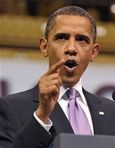 How wrong I was. President Obama, lambasted by his critics for being ponderous, has
acted with lightening speed: less than 24 hours after that Rolling Stone article, General Stanley McChrystal was forced out of his job in place of the only person that could pick up where
he left off, namely General David Petraeus. In acting swiftly, the US president has moved to restore the authority and respect his position as Commander-in-Chief deserves; and he has begun to
re-establish the kind of civil-military relations that need to exist in militarily-capable liberal democracies like the United States.
How wrong I was. President Obama, lambasted by his critics for being ponderous, has
acted with lightening speed: less than 24 hours after that Rolling Stone article, General Stanley McChrystal was forced out of his job in place of the only person that could pick up where
he left off, namely General David Petraeus. In acting swiftly, the US president has moved to restore the authority and respect his position as Commander-in-Chief deserves; and he has begun to
re-establish the kind of civil-military relations that need to exist in militarily-capable liberal democracies like the United States.
What effect the change of commander will have in Kabul remains unclear. But it will have a long-term positive effect on US democracy. The last ten years of warfare has thrust America’s top
soldiers into the limelight. First it was Paetreus, then it was McChrystal. Both were lionised by the politicians and the media. Indeed, in 2007 it looked as if General Petraeus not George W Bush
ran Iraq policy. This is nothing new. Generals Grant, Pershing, Marshall, Eisenhower, and MacArthur were also feted in their time and celebrated afterwards. But President Obama has from the
beginning of his administration sought to restore the appropriate relationship that ought to exist between a civilian leader and his military subordinates. Generals need to be respected, and given
the tools for any job they are asked to undertake; but they need to understand who they work for – the civilian leadership.
Daniel Korski
Hail to the chief






Comments